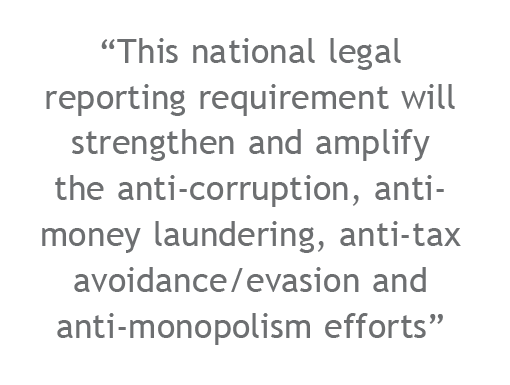 Financial crime has haunted Indonesia for many decades. The lack of transparency, especially around the ultimate beneficial ownership of corporations, has led to many problematic situations, including fraud, that often go unidentified and undetected. These include but are not limited to shadow monopolism; conflicts of interest among state-owned and private companies; and fictitious or suspicious transactions, debts, payments, etc., within affiliated companies to falsify their accounts, reduce taxes, or avoid state obligated liabilities such as tax, concession fee, abandonment and restoration fees. Moreover, tracing the proceeds of financial crime in Indonesia can be difficult as many criminals use nominee owners for their assets, resulting in low asset recovery rates.
Financial crime has haunted Indonesia for many decades. The lack of transparency, especially around the ultimate beneficial ownership of corporations, has led to many problematic situations, including fraud, that often go unidentified and undetected. These include but are not limited to shadow monopolism; conflicts of interest among state-owned and private companies; and fictitious or suspicious transactions, debts, payments, etc., within affiliated companies to falsify their accounts, reduce taxes, or avoid state obligated liabilities such as tax, concession fee, abandonment and restoration fees. Moreover, tracing the proceeds of financial crime in Indonesia can be difficult as many criminals use nominee owners for their assets, resulting in low asset recovery rates.
But change is in the wind. President Joko Widodo recently signed the Presidential Decree Number 13 of 2018, “Implementation of the Principle on Recognising Beneficial Ownership of Corporations in the Framework for the Prevention and Eradication of Money Laundering and Criminal Acts of Terrorism Funding” on March 1, 2018, which is now in force. This decree mandates that all Indonesian corporations must report their beneficial ownership status, with a particular focus on ownership structures whereby any individual who has 25 percent or more of shares or capital, or holds 25 percent of voting rights or receives up to 25 percent of the profits; has authority to appoint or dismiss the board of directors or anyone who has control of the corporation; receives any benefits from a corporation’s activities; or is the true owner of the shares, funds, assets and other resources.
Although similar localised regulations already exist in Indonesia, this national legal reporting requirement will strengthen and amplify the anti-corruption, anti-money laundering, anti-tax avoidance/evasion and anti-monopolism efforts. This may also potentially increase asset recovery rates. To date, law enforcement agencies have not been able to repatriate all state loss and proceeds of such crimes.

The real challenge ahead will be to ensure all corporations disclose their ultimate beneficial owner/s (as per the above-mentioned requirements) truthfully and voluntarily. The government can help create a framework for compliance by taking three key steps:
- Implementing proactive, technology-enabled due diligence. By implementing big data and forensic data analytics, enhanced with machine learning, regulators would be better positioned to ascertain if data contained in self-provided reports is accurate. Source data sets can include records of banking transactions, population data, asset ownership data (both financial and non-financial) and tax files.
- Establishing, communicating and enforcing significant consequences for noncompliance. Stiff penalties should be imposed for noncompliance and can include consequences such as the revocation of business licences.
- Enlisting public opinion. Societal expectations and pressure can be heightened by increasing the public’s accessibility to information.
In support of these critical steps, the government should consider implementing as soon as possible the supporting architecture, to include the following:
- Developing and optimising a single identification number; currently there are at least 11 different government institutions issuing different identification numbers to Indonesian citizens. Passing legislation mandating the integration of financial services institutions data including customer file, bank account, bank balance, bank transactions etc. Currently there are hundreds of national banks and thousands of rural banks as well as many other financial institutions operating in Indonesia.
- Strengthening the Ministry of Justice with sufficient resources to carry out its mission.
- Optimising and implementing an international Automatic Exchange of Information (AEoI). There are currently 79 countries committed to sharing their Indonesian-related financial data with the Indonesian Tax Office.
It should be noted that the beneficial ownership disclosure obligation in the above-mentioned Decree applies to corporations registered in Indonesia only. This means that the disclosure obligation does not apply to Indonesian citizens who own corporations registered overseas, which is a common practice. Although the war is far from over, all Indonesian corporations should be aware of and be familiar with the new legal requirement or otherwise be prepared to face consequential penalties.
Kroll is the leading global provider of risk solutions with more than 45 years of experience in helping clients make confident risk management decisions about people, assets, operations and security. For more information, visit www.kroll.com.

By Budi Santoso, Senior Director, Kroll
E: budi.santoso@kroll.com
W: www.kroll.com

